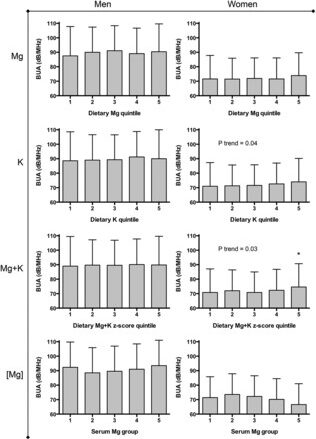The relationship between potassium intake (K) and bone volume has been studied for about 50 years. The two main hypotheses for the development of osteoporosis today emphasize the critical role of potassium in the metabolism of bone minerals.
Potassium and Hypotheses for The Development of Osteoporosis
The first hypothesis is the leaching of calcium from the bones due to acidification of the body
The hypothesis suggests that the acid-base balance in the body is primarily regulated by bone minerals, especially calcium (Ca). With age, the body becomes acidic, and its pH increases. Calcium is released from the bones to compensate for excess acidity, which has an alkaline reaction.
This hypothesis proposes to treat and prevent osteoporosis using an alkaline diet – eating foods rich in potassium and magnesium, such as fruits and vegetables. It is assumed that, in this case, dietary potassium partially compensates for the increased acidity of the body.
This hypothesis appeared in 1968 and is still very popular. However, the scientific community is divided into two opposing camps regarding the benefits of an alkaline diet for the treatment and prevention of osteoporosis. The reason for the separation is the inconsistency of research: some studies show the benefit of an alkaline diet, while others show its uselessness.
2nd Hypothesis is The Loss Of Calcium Through The Kidneys
Several studies show that sufficient potassium intake reduces the excretion of calcium in the urine.
For example, back in 1989, scientists from the Medical College of Wisconsin (USA) found that the intake of potassium bicarbonate by healthy men reduces the excretion of calcium in the urine by 0.9 mmol/day. Moreover, the magnitude of intestinal absorption of calcium does not change. As a result of the intake of potassium bicarbonate, a positive balance of calcium in the body is formed, which contributes to the preservation of bone volume.
Another demonstrative study was conducted in 1994 at the University of San Francisco (USA) with the participation of women in the postmenopausal period. Potassium bicarbonate improved bone mineral balance and skeletal metabolism in the subjects.
Potassium against Osteoporosis: Summarizing Two Hypotheses
An important conclusion that scientists make is that potassium intake involves at least two mechanisms for preventing osteoporosis:
- Potassium reduces the overall acidity of the body;
- Potassium prevents the excretion of calcium through the kidneys.
However, experts warn of the risk of potassium overload and hyperkalemia, which can occur when taking large doses of potassium bicarbonate.
Dietary Potassium is A Safe Way to Enhance The Bone Mineral Density
The safe way out is to consume foods high in potassium. A significant proportion of research has focused on the association of diets rich in potassium with the development and progression of osteoporosis.
For example, in 2015, at the University of East Anglia, they studied the relationship between osteoporotic fractures and the amount of potassium and magnesium in food. It was found that women had a reduced risk of fractures if their diet was rich in potassium, potassium, and magnesium. Moreover, if one magnesium prevailed in the diet, the risk of fractures increased. No dependence was found for men:
An earlier study conducted in 2008 at the University of Eastern Australia found a long-term positive effect of potassium. The study involved women 70-80 years old. High dietary potassium intake improved hip mineral density. Moreover, the positive effect of potassium persisted for 5 years.
A 2020 study by an international team of scientists showed that a high dietary intake of potassium reduces the risk of osteoporosis in older Korean women by 68%. The researchers observed increased bone mineral density in the lumbar spine, hip joint, and femoral neck.
Dietary Sources of Potassium
Potassium is widely distributed in plant and animal foods. Vegetables, fruits, legumes, cereals, meat, offal, and milk contain significant potassium ions. However, this potassium is absorbed differently by the body. Also, its concentration may decrease during the cooking process.
There is more potassium in fruits, vegetables, and lean fish than in grains and meats. Refined fats and sugars are very low in potassium and interfere with absorption from other foods. Cooking reduces the concentration of potassium in foods. The most gentle mode is steaming or short-term frying.
According to doctors from the medical school Brousset-Hotel-Dieu (France), you should not worry that as a result of the diet, you will have an excess of potassium. However, people with kidney failure and severe diabetes should check with their doctor first.
Experts show in figures how sharply potassium consumption has decreased with the advent of agriculture and agro-industry. If, before this era, people consumed more than 200 mmol of potassium per day, then a modern person sometimes receives less than 50.
Findings
A diet rich in potassium helps maintain bone mineral density and prevents the development of osteoporosis, which is the safest way to take potassium.
A significant amount of potassium is found in most foods. However, cooking, refined fats, and sugar reduce their concentration and bioavailability.
Useful article, necessary information? Share it!
Someone will also find it useful and necessary:
Sources
- Diet And Osteoporosis
- Potassium bicarbonate, but not sodium bicarbonate, reduces urinary calcium excretion and improves calcium balance in healthy men
- Improved Mineral Balance and Skeletal Metabolism in Postmenopausal Women Treated with Potassium Bicarbonate
- Dietary magnesium and potassium intakes and circulating magnesium are associated with heel bone ultrasound attenuation and osteoporotic fracture risk in the EPIC-Norfolk cohort study
- The effects of high potassium consumption on bone mineral density in a prospective cohort study of elderly postmenopausal women
- The association of potassium intake with bone mineral density and the prevalence of osteoporosis among older Korean adults
- Protective Effects of High Dietary Potassium: Nutritional and Metabolic Aspects




